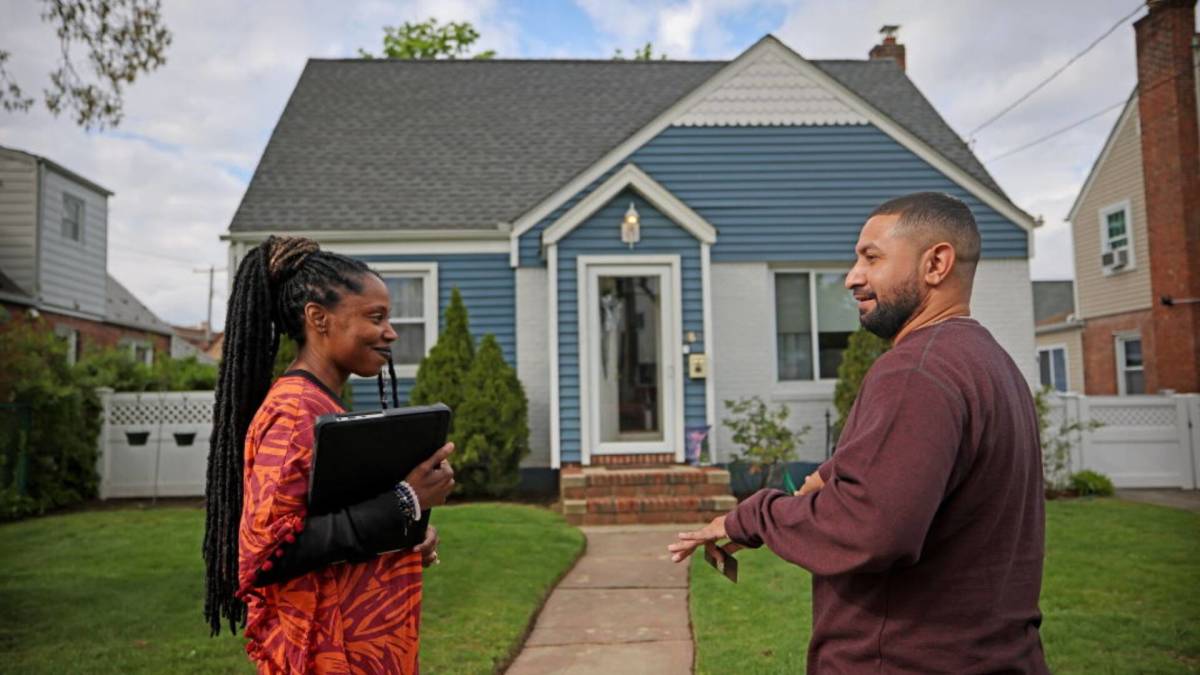The housing market has been gridlocked for the past few years, as rising home prices, stubborn mortgage rates, and limited inventory dampened enthusiasm among buyers and sellers.
Homebuyers in particular have been hit by the rising cost of living from inflation, preventing many would-be buyers from saving for a down payment and entering the housing market.
Fewer sellers listing their homes has created a housing inventory shortage, increasing competition for the limited affordable housing options.
🏦 🏡 Don't miss the move: SIGN UP for TheStreet's FREE daily newsletter 🏦 🏡
Though housing inventory is improving, overall home sales are still below pre-COVID levels. As prices rise, many lower-income homebuyers have become priced out of the market, creating mass vacancies despite inventory increases.
Berkshire Hathaway Home Services expects younger and low-income homebuyers to be adversely affected as the cost of living—especially housing—outpaces wage growth.
Image source: Getty Images
Berkshire Hathaway HomeService explains mortgage rates are driving housing market slump
Mortgage rates have hovered between 6.5% and 7% throughout 2025, despite initial projects that sub-6% rates were on the horizon this year. Though high mortgage rates increase the cost of buying home, they also discourage sellers from listing their homes and giving up a competitive mortgage.
82% of all homeowners have a mortgage rate below 6%, though Realtor.com predicts that share could fall to 75% below by the end of the year.
The Berkshire Hathaway HomeServices blog explains how high mortgage rates are deterring sellers who will be purchasing new homes and taking on a new mortgage.
“Many homeowners are reluctant put their homes on the market and give up the low mortgage rates they already have. To them, high price gains won’t mitigate their ability to pay more for another home at significantly higher interest rates,” according to the blog.
More on homebuying:
- The White House will take surprising approach to curb mortgage rates
- Housing expert reveals surprising ways to reduce your mortgage rate
- Dave Ramsey predicts major mortgage rate changes are coming soon
- Warren Buffett's Berkshire Hathaway sounds the alarm on the 2025 housing market
However, housing inventory has picked up considerably and sellers now outnumber buyers in the market, demand, homebuyer budget, and housing prices are mismatched. The result has been sluggish housing activity despite an increase in listings.
“Meanwhile the number of unsold existing homes for sale rose 9% month-over-month to 1.45 million, creating the equivalent of 4.4 months’ supply on hand,” the blog continues. “Economists with NAR say that housing sales have remained at 75% of pre-pandemic levels for three years, despite seven million jobs being added to the economy,” the blog continues.
Berkshire Hathaway HomeServices notes that younger and low-income home buyers have been priced out of the market
A staggering 86% of renters would like to buy a home, but can't afford to. However, renters are faced with a much higher cost burden than homeowners, as housing prices and rents have surged, far outpacing income.
The surge in housing prices has limited the affordable housing prospects for renters, forcing many to continue renting out of necessity.
Related: Bank of America predicts major housing market changes are coming soon
“It’s important to note that housing shortages are primarily affecting low-income, middle-income, and first-time homebuyers,” The Berkshire Hathaway HomeServices blog explained.
“Households earning $75,000 annually can afford only 21.2% of available homes for sale priced at $255,000 or less, down from 49% of listings before 2020. Higher-income households earning $250,000 or more can afford more than 80% of home listings.”
Those who rent into adulthood have typically been priced out of the housing market, unable to save for a down payment while covering rising rents. Due to lack of savings and financial assets, most renters are unable to obtain a mortgage, but still devote more of their salary on rent than most homeowners do on mortgage payments.
“Three out of four of the lowest-income renters spend more than half their income on rent, making it nearly impossible for these households to overcome poverty, much less to become homeowners one day. By contrast, conventional mortgage standards suggest that borrowers pay no more than 28% of their gross income for housing.”
Related: Veteran fund manager unveils eye-popping S&P 500 forecast













